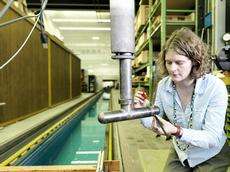Nuclear energy phase-out is possible

Restructuring the energy system without nuclear power by 2050 is in principle technologically possible and economically manageable. However, it will demand a concerted effort by the whole of society. This is the conclusion reached by ETH Zurich researchers in a study they presented at the Energy Talks 2011.
Over the past few months, a group of researchers at the Energy Science Center (ESC) of ETH Zurich have carried out an intensive examination of whether the available options will enable Switzerland to scope out a medium-term energy future without nuclear power, as decided by the Swiss Federal Council in May. Their answer was yes.
However, a step-by step restructuring of Switzerland’s energy systems during the coming years and decades will require great efforts by all areas of society. Nevertheless, a phase-out is not only technologically possible but would also enable positive long-term growth in all sectors of the economy. The study examined the period up to 2050. The researchers presented the most important results of the study (see box) at the Energy Talks at ETH Zurich on 2 September 2011.
No relaxations in climate targets
The unalterable boundary conditions applying to the ETH Zurich researchers’ modelling calculations are that the global climate targets – a maximum warming of two degrees centigrade – must be complied with. For Switzerland this means reducing annual per capita CO2 emissions from the present 5.2 to less than 2 tons by 2050 and to 1 ton towards the end of the century.
These targets require that, by 2050, this country must achieve, among other things, CO2-free building heating systems, efficient, partly electrified mobility, and minimal CO2 emission in electricity generation, all developments that are expected to be necessary and possible.
Hydroelectric power and new renewable energy sources
One of the biggest challenges facing the studies was to make plausible forecasts of the future electricity supply, which turn out differently depending on economic growth, population development and efficiency increases. For this purpose, the researchers calculated three demand scenarios and predict that, in 2050, Switzerland will have a gross electricity production of between 67 and 92 terawatt-hours (TWh). The most likely medium scenario assumes an annual electricity demand of around 80 TWh.
According to Konstantinos Boulouchos, coordinating author of the ETH Zurich study and Professor of Aerothermochemistry and Combustion Systems, it is clear that hydroelectric power, which amounts to just under 50 percent of total electricity generation and has limited potential for expansion, will continue to make an important base-load contribution. If the remaining 40 TWh is to be provided without nuclear energy, this will need a major expansion in new renewable energy sources, mainly photovoltaic, followed by the localised utilisation of biomass and finally geothermal energy. According to the ETH Zurich researchers, flexible gas-fired power stations or electricity imports will be indispensable to cover demand peaks, at least in the short term. However, foreseeable technological development should enable, from 2020 to 2025 onwards, the construction of combined gas-fired power stations in which the CO2 produced can be captured and stored.
Higher efficiency for system components
Energy efficiency is of key importance for the successful implementation of sustainable energy production without nuclear power and with as few fossil energy sources as possible. Göran Andersson, Professor of Electricity Power Systems and High Voltage Engineering and one of the authors of the ETH Zurich study, says, «Anyone who thinks this just means energy consumption at the consumer’s premises is too short-sighted.» He says that there is an equal need to minimise energy losses in electricity distribution (currently 7 percent) and in storage.
The ETH Zurich researchers see the biggest potential energy saving as being in the area of buildings and mobility, whereby electricity as a proportion of energy production is growing, and electricity will become the backbone of the energy system in the future.
The expansion and optimisation of storage facilities and networking on the one hand and advances in control and regulation technology on the other should contribute to handling energy more efficiently. At the same time, there is still great need for research, e.g. in the area of energy metering technology. This specialist discipline, still in its infancy, develops prediction models for wind and photovoltaic electricity in-feeds with the aim of increasing the overall stability of the electricity power network.
In relation to the expansion and restructuring of the electricity network, the ETH Zurich researchers stress that Switzerland must also be seen as an important part of a future European electricity market.
Seizing the opportunity for re-industrialization
Within the ETH Zurich study, Lucas Bretschger, Professor of Resource Economics, analysed the effects that a progressive restructuring of energy production would have on prosperity and growth. Bretschger concludes that the costs to the national economy of a long-term transformation are small. Although economic development would be retarded slightly compared to growth with the previous energy sources, the ETH Zurich study still predicts positive growth rates (between 0.7 and 1.7 percent).
In the ETH Zurich model, sectors with a large proportion of clean technology and investment, e.g. the electrical industry and some areas of the mechanical engineering industry, would benefit to a particularly large extent from a restructuring of the energy system. Despite numerous technical challenges, the authors see opportunities in the energy turnaround above all to re-industrialise Switzerland through the investments and innovations that will be triggered.
Ultimately, and in this sense the researchers are passing the ball onto the politicians, the preconditions to ensuring that the planned radical restructuring of Switzerland’s energy system can succeed are cost transparency and planning security.
Provided by ETH Zurich
















